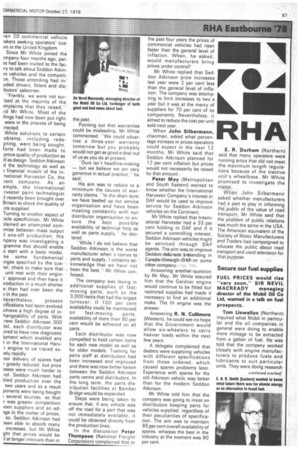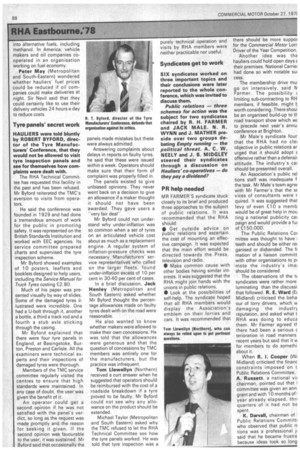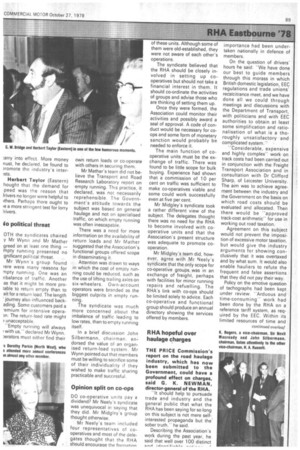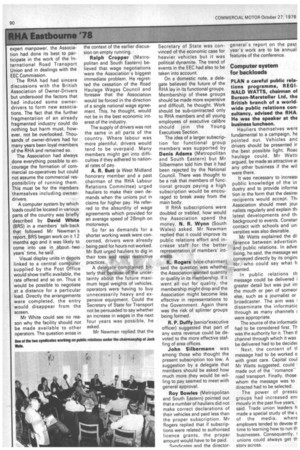RHA
Page 89

Page 90

Page 91

Page 92

If you've noticed an error in this article please click here to report it so we can fix it.
E. R. Durham (Northern) said that many operators were running artics that did not meet the maximum length regulations because of the tractive unit's wheelbase. Mr White promised to investigate the matter.
When John Silbermann asked whether manufacturers had a part to play in informing the public of the value of road transport, Mr White said that the problem of public relations was much the same in the USA. The American equivalent of the Society of Motor Manufacturers and Traders had campaigned to educate the public about road transport and used television for that purpose.
Secure our fuel supplies FUEL PRICES would rise "vary soon," SIR NEVIL MACREADY managing director of the Mobil Oil .Co Ltd, warned in a talk on fuel prospects.
Tom Llewellyn (Northern) inquired what Mobil in particular and the oil companies in general were doing to enable more mileage to be extracted from a gallon of fuel. He was told that the company worked closely with engine manufacturers to prbduce fuels and lubricants to suit particular units. They were doing research continued overleaf into alternative fuels, including methanol. In America, vehicle makers and oil companies cooperated in an organisation working on fuel economy.
Peter May (Metropolitan and South-Eastern) wondered whether hauliers' fuel prices could be reduced if oil companies could make deliveries at night. Sir Nevil said that they could certainly like to use their delivery vehicles 24 hours a day to reduce costs.
Tyre panels' secret work
HAULIERS were told bluntly by ROBERT BYFORD, director of the Tyre Manufacturers' Conference, that they would not be allowed to visit tyre inspection panels and see for themselves how complaints were dealt with.
The RHA Technical Committee has requested this facility in the past and has been refused. Mr Byford reiterated the TMC's aversion to visits from operators.
He said the conference was founded in 1929 and had done a tremendous amount of work for the public in promoting safety. It was represented on the British Standards Institution and worked with EEC agencies. Its service committee prepared charts and supervised the tyre inspection scheme.
Mr Byford showed examples of 10 posters, leaflets and booklets designed to help users, including the Service Manual for Truck Tyres costing £2.80.
Much of his paper was presented visually by way of slides. Some of the damaged tyres illustrated were incredible. One had a U-bolt through it, another a bottle, a third a track rod and a fourth a stub axle sticking through the casing.
Mr Byford explained that there were four tyre panels in England, at Basingstoke, Burton, Preston and Carlisle. All the examiners were technical experts and their inspections of damaged tyres were thorough.
Members of the TMC service committee regularly visited the centres to ensure that high standards were maintained. In any case of doubt, the user was given the benefit of it.
An operator could get a second opinion if he was not satisfied with the panel's verdict, so long as the request was made promptly and the reason for seeking it given. If the second opinion was favourable to the user, it was sustained. Mr Byford said that occasionally the panels made mistakes but these were always admitted.
Answering complaints about delays in reports on faulty tyres, he said that these were issued within a week. Operators should make sure that their form of complaint was properly filled in.
The panels existed to give unbiased opinions. They never went back on a decision to give an allowance if a maker thought it should not have been 'awarded. They gave users a "very fair deal".
Mr Byford could not understand why under-inflation was so common when a set of tyres on an articulated vehicle cost about as much as a replacement engine. A regular system of
inflation-pressure checks was necessary. Manufacturers' ser
vice representatives who called on the larger fleets, found under-inflation excess of 10 per cent in 30-40 per cent of cases.
In a brief discussion, Jack Henley (Metropolitan and
South Eastern) asked whether Mr Byford thought the percentage allowances made on faulty tyres dealt with on the road were reasonable.
He also wanted to know whether makers were allowed to make their own concessions. He was told that the allowances were generous and that the question of concessions by TMC members was entirely one for the manufacturers, but the practice was infrequent.
Tom Llewellyn (Northern) received a curt answer when he
suggested that operators should be reimbursed with the cost of a roadside breakdown if a tyre proved to be faulty. Mr Byford could not see why any allowance on the product should be extended.
Michael Taylor (Metropolitan and South Eastern) asked why the TMC refused to let the RHA Technical Committee see how the tyre panels worked. He was told that tyre inspection was a
PR help needed
MR FARMER'S syndicate stuck closely to its brief and produced three approaches to the subject of public relations. It was recommended that the RHA should: 0 Get outside advice on public relations and ascertain the cost of mounting an effective campaign. It was expected that the main effort would be directed towards the Press, television and radio.
• Make common cause with other bodies having similar interests. It was suggested that the RHA might join hands with the unions in public relations.
O Look at the possibilities of self-help. The syndicate hoped that all RHA members would display the Association's emblem on their lorries and cars. It was recommended that
there should be more suppoi for the Commercial Motor Lorr Driver of the Year Competition.
Another idea was tha hauliers could hold open days E their premises. National Carrie' had done so with notable sui cess.
The membership drive mui go on intensively, said N Farmer. The possibility I limiting sub-contracting to RH members, if feasible, might t worth considering. There shou be an organised build-up to tt road transport show which wi to precede next year's annu conference at Brighton.
Mr Male's syndicate four that the RHA had no cle objective in public relations ar urged that it should adopt e offensive rather than a defensiy attitude. The industry's Ca! should be presented overall.
An Association's public rel tions staff was inadequate f the task. Mr Male's team agree with Mr Farmer's that the s( vices of consultants were r quired. It was suggested that levy of even £10 a memb would be of great help in mou ting a national publicity cal paign and would provide a fui of ,£150,000.
The Public Relations Coi mittee was thought to have teeth and should be either re( ganised or disbanded. The f( mation of a liaison cornmitt with other organisations to pi mote the industry's imai should be considered.
The observations of the ty syndicates were rather more luminating than the discussi that followed. R. E. Ward (E Midland) criticised the beha our of lorry drivers, which yiy, damaging the industry reputation, and asked what t RHA was doing to educe them. Mr Farmer agreed tt there had been a serious c terioration in road manners recent years but said that it w for members to do somethi about it.
When R. I. Cooper (Wi Midland) criticised the financ constraints imposed on t Public Relations Committee, A. Russett, a national vi chairman, pointed out that committee was given an ann grant and with 10 months of year already elapsed, thri quarters of it had not be spent.
K. Darvall, chairman of
Public Relations Committi who observed that public ri tions was a professional j1 said that he became frustra because ideas took so long
:arry into effect. More money nust, he declared, be found to )romote the industry's interists.
Herbert Taylor (Eastern) hought that the demand for peed was the reason that 'rivers no longer were helpful to ithers. Perhaps there ought to le a more stringent test for lorry lavers.
Jo political threat
0TH the syndicates chaired y Mr Wynn and Mr Mather greed on at least one thing — mpty running presented no gnificant political threat.
Mr Wynn's group found lere were many reasons for ^npty running. One was an nbalance of traffic. Another as that it might be more protable to return empty than to ait for a return load. The length journey also influenced backading. Some customers paid a -emium for intensive opera)n: The return-load rate might 3unacceptable.
"Empty running will always with us,declared Mr Wynn. )erators must either find their
own return loads or co-operate with others in securing them.
Mr Mather's team did not believe the Transport and Road Research Laboratory report on -empty running. This practice, it declared, was not necessarily reprehensible. The Government's attitude towards the subject was based on general haulage and not on specialised traffic, on which empty running was often inescapable.
There was a need for more information on the availability of return loads and Mr Mather suggested that the Association's functional groups offered scope in disseminating it.
Attention was drawn to ways in which the cost of empty run ning could be reduced, such as the use of lifting trailing axles on six-wheelers. Own-account operators were branded as the biggest culprits in empty running.
The syndicate was much more concerned about the imbalance of traffic leading to low rates, than to empty running itself.
In a brief discussion John Silbermann, chairman, en dorsed the value of an organ ised return-load system. Mr Wynn pointed out that members must be willing to sacrifice some of their individuality if they wished to make traffic sharing practicable and successful.
Opinion split on co-ops
DO co-operative units pay a dividend? Mr Neely's syndicate was unequivocal in saying that they did. Mr Midgley's group thought otherwise.
Mr Neely's team included four representatives of cooperatives and most of the delegates thought that the RHA should encouraae the form:At-inn
of these units. Although some of them were old-established, they were not aware of each other's operations.
The syndicate believed that the RHA should be closely involved in setting up cooperatives but should not take a financial interest in them. It should co-ordinate the activities of groups and advise those who are thinking of setting them up.
Once they were formed, the Association could monitor their activities and possibly award a seal of approval. A code of conduct would be necessary for coops and some form of monetary sanction would probably be needed to enforce it.
The main function of cooperative units must be the exchange of traffic. There was found to be little scope for bulk buying. Experience had shown that a commission of 10 per cent on traffic was sufficient to make co-operatives viable and some could work successfully even at five per cent, Mr Midgley's syndicate took a rather different view of the subject. The delegates thought there was no need for the RHA to become involved with cooperative units and that the Association's present structure was adequate to promote cooperation.
Mr Midgley's teem did, however, agree with Mr Neely's syndicate that the only scope for co-Operative groups was in an exchange of freight, perhaps with facilities for minor running repairs and refuelling. The RHA's link with co-ops should be limited solely to advice. Each co-operative and functional group should produce an annual directory showing the services offered by members.
RHA hopeful over haulage charges
THE PRICE Commission's report on the road haulage industry, which has now been submitted to the Government, could have a profound effect on charges, said G. K. NEWMAN, director-general of the RHA.
"It should help to pursuade trade and industry and the general public that what the RHA has been saying for so long on this subject is not mere selfinterested propaganda but the sober truth,he said.
Describing the Association's work during the past year, he said that well over 100 distinct
nr4 _ _ r
importance had been undertaken nationally in defence of members.
On the question of drivers' hours he said: "We have done our best to guide members through this morass in which British domestic legislation, EEC regulations and trade unions' recalcitrance meet, and we have done all we could through meetings and discussions with the Department of Transport, with politicians and with EEC authorities to obtain at least some simplification and rationalisation of what is a thoroughly unsatisfactory and complicated system."
"Considerable, expensive and highly complex" work on track costs had been carried out in conjunction with the Freight Transport Association and in consultation with Dr Clifford Sharp, of Leicester University. The aim was to achieve agreement between the industry and the Government on the basis on which road costs should be evaluated and allocated. Then there would be "approved track-cost arithmetic" for use in working out road taxation.
Agreement on this subject would not prevent the imposition of excessive motor taxation, but would give the industry arguments for showing conclusively that it was overtaxed and by what sum. It would also enable hauliers to refute the frequent and false assertions that they did not pay their way.
Policy on the emotive question of tachographs had been kept under review. -Arduous and time-consuming" work had been done by the RHA on a reference tariff system, as required by the EEC. Within its limited resources of time and
continued overleaf
expert manpower, the Association had done its best to participate in the work of the International Road Transport Union and in dealings with the EEC Commission.
The RHA had had sincere discussions with the British Association of Owner-Drivers but undersiood the factors that had induced some ownerdrivers to form new associations. The fact that the further fragmentation of an already fragmented industry could do nothing but harm must, however, not be overlooked. Thousands of owner-drivers had for many years been loyal members of the RHA and remained so.
The Association had always ,done everything possible to encourage the formation of commercial co-operatives but could not assume the commercial responsibility of running them. This must be for the members themselves including ownerdrivers.
A computer system by which loads could be located in various parts of the country was briefly described by David White (BRS) in a members' talk-back that followed Mr Newman's report. BRS began work on it 1 2 months ago and it was likely to come into use in about two years' time, he said.
Visual display units in depots linked to a central computer supplied by the Post Office would show traffic available, the rate offered and so on. Thus it would be possible to negotiate at a distance for a particular load. Directly the arrangements were completed, the entry would disappear from the screen.
Mr White could see no reason why the facility should not be made available to other operators. The question arose in
the context of the earlier discussion on empty running.
Ralph Cropper (Metropolitan and South Eastern) believed that wage negotiations were the Association's biggest immediate problem. He regretted the cessation of the Road Haulage Wages Council and foresaw that the Association would be forced in the direction of a single national wage agreement. This, he thought, would not be in the best economic interest of the industry.
The supply of drivers was not the same in all parts of the country. Where labour was more plentiful, drivers would tend to be overpaid. Many members might get into difficulties if they adhered to national rates of pay.
A. R. Butt (a West Midland honorary member and a past chairman of the RHA Labour Relations Committee) urged hauliers to make their own demands when the unions put in claims for higher pay. He referred to the absurdity of wage agreements which provided for an average speed of 28mph on motorways. _ So far as demands for a shorter working week were con-. cerned, drivers were already being paid for hours not worked. Mr Butt urged hauliers to dig in their toes and resist restrictive practices.
A delegate complained bitterly that because of the uncertainty about the future maximum legal weights of vehicles, operators were having to buy unnecessarily heavy and expensive equipment. Could the Secretary of State for Transport not be persuaded to say whether an increase in wages in the next four years was possible, he asked.
Mr Newman replied that the Secretary of State was convinced of the economic case for heavier vehicles but it was political dynamite. The trend of events in the EEC had also to be taken into account.
On a domestic note, a delegate believed the future of the RHA lay in its functional groups. Membership of these groups should be made more expensive and difficult, he thought. Work should be sub-contracted only to RHA members and all young employees of executive calibre should join the Young Executives Section.
The idea of a larger subscription for functional group members was supported by Denis Adams (Metropolitan and South Eastern) but Mr Silbermann told him that it had been rejected by the National Council. There was thought to be a risk that members of functional groups paying a high subscription would be encouraged to break away from the main body.
If RHA subscriptions were doubled or trebled, how would the Association spend the money, N. R. Wynn (South Wales) asked. Mr Newman replied that it could improve its public relations effort and increase staff for the better representation of members' interests.
K. Rogers (vice-chairman) said the question was whether the Association wanted quantity or quality in its membership. If it went all out for quality, the membership might drop and the Association might become less effective in representations to the Government. Again there was the risk of splinter groups being formed.
R. P. Duffy (seniorexecutive officer) suggested that part of any extra revenue could be devoted to the more effective staffing of area offices.
John Silbermann was among those who thought the present subscription too low. A suggestion by a delegate that members should be asked how much more they would be willing to pay seemed to meet with general approval.
Roy Bowles (Metropolitan and South Eastern) pointed out that a number of hauliers did not make correct declarations of their vehicles and paid less than the proper subscription. Mr Rogers replied that if subscriptions were related to authorised licence grants, the proper amount would have to be paid.
synclirates and the director
general's report on the past year's work are to be annual features of the conference.
Computer system for beckloads
PLAN a careful public relations programme, REGINALD WATTS, chairman col Burson-Marsteller Ltd, the British branch of a worldwide public relations consultancy, advised the RHA. He was the speaker at the business luncheon.
Hauliers themselves were fundamental to a campaign, he pointed out. Vehicles anc drivers should be presented ir the best possible light. Roac haulage could, Mr Watt! argued, be made as attractive a! any other business if the wil were there.
It was necessary to increas( public knowledge of the in dustry and to provide informa tion in the form that the desire( recipients would accept. Th. Association should meet joui nalists regularly and explain 01 latest developments and th background to events. Constar contact with schools and un versities was also desirable.
Mr Watts explained the diference between advertisin and public relations. In adve tising, he said, the message wa conveyed directly by its origin tor, who could say what h wanted.
In public relations th message could be delivered i greater detail but was put in; the mouth or pen of someor else, such as a journalist or broadcaster. The aim was 1 disseminate the informatic through as many channels ; were appropriate.
The source of the informatic had to be considered first. TT was the authority for it. Then tl channel through which it was be delivered had to be decide(
Next, the content of tl message had to be worked o with great care. Capital coul Mr Watts suggested, could made out of the -romance" road transport. Finally, those whom the message was to directed had to be selected.
The power of pressu groups had increased em mously in the past five years, said. Trade union leaders h made a special study of the t. of the media, where employers tended to devote tf time to learning how to run th businesses. Consequently, 1 unions could always get th story across.
































































































































































